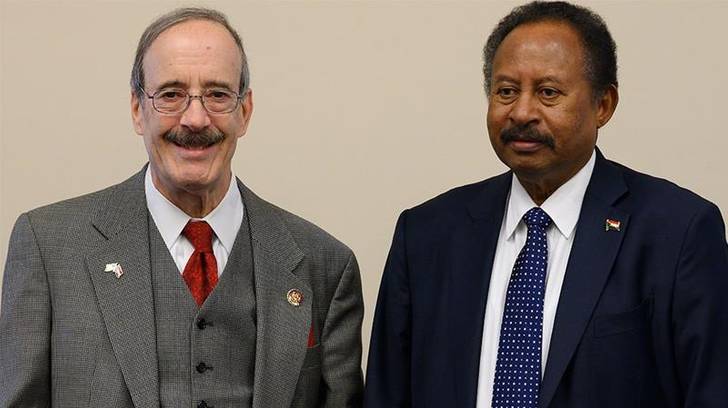United States and Sudan announce steps to improve relations

Sudanese Prime Minister Abdalla Hamdok meets with House Foreign Affairs Committee Chairman Eliot Engel on Capitol Hill in Washington, DC [Jim Watson/AFP]
BY USMAN MAMA
Sudanese Prime Minister Abdalla Hamdok, who is on his first visit to Washington this week, has something tangible to show for it: the announcement that the United States and Sudan will soon exchange ambassadors.
The U.S. government added Sudan to its list of countries that sponsor terrorism back in 1993, which has led to the souring of relations between the two nations for nearly three decades. The overthrow last April of then-Sudanese president Omar al-Bashir—whom the United States had accused of sponsoring terrorist groups—has created a path for improved relations between the two countries. The trend got a significant boost today, Wednesday, with the announcement that the two countries are ready to exchange ambassadors.
In a statement released today by the State Department, Secretary of State Mike Pompeo said: “This decision is a meaningful step forward in strengthening the US-Sudan bilateral relationship, particularly as the civilian-led transitional government works to implement the vast reforms under the political agreement and constitutional declaration of August 17, 2019.”
Already last month, the State Department was allegedly contemplating the removal of Sudan from the black list of terrorism sponsors. But the actual removal requires congressional approval.
Omar al-Bashir’s 30-year rule came to a violent end after months of protests and sit-ins outside the military headquarters in Karthoum, culminating in the dictator’s arrest on April 11. On the surface, the uprising, which many called a “bread protest” against a rise in inflation, was in fact deeper than that. The protesters, mostly young professionals who were fed up with al-Bashir’s policies, gave voice to a decades-long quest for freedom and justice.
Al-bashir’s toppling was followed by a rather chaotic four months that put the ensuing Transitional Military Council at odds with the people. But the council transferred power to the Sovereignty Council of Sudan which appointed Abdalla Hamdok as Prime Minister during the transitional period, leading to his swearing-in on 21 August.
Less than four months after taking charge, Hamdok, formerly Deputy Executive Secretary of the United Nations Economic Commission for Africa, (UNECA), is in Washington with an ambitious agenda that includes i) removing Sudan from the notorious list of nations that sponsor terrorism; ii) removal of a series of other U.S. sanctions related to human rights violations; iii) clearing the way for the country to once again receive a much-needed international financial assistance.
With Secretary of State Mike Pompeo away in Lisbon, the Sudanese prime minister met today with Under Secretary of State for Political Affairs David Hale. (See a brief of the meeting.)
In an interview with NPR, a major radio station in the nation’s capital, Hamdock stated his country’s quest for foreign investment: “we would like to see decent companies from all over the world, but particularly from the U.S., to come and invest in our country, that will create jobs.”
That, he emphasized, underscores the need for his country to be removed from the black list in the notorious company of North Korea, Iran and Syria.”


